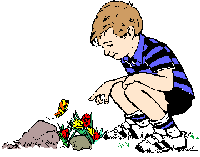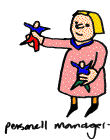Sweet Bird Of Youth
by Anne Manne



MY little daughter, aged five, is playing hop- scotch with a friend. With great care and deliberafion she looks for a pebble, and in a moment of luck finds the Perfect Stone. It is very round, small, smooth and shiny. She clutches the stone, refusing rather gracefully to relinquish it to her friend who covets its perfection. They begin hopping, wobbly, not exactly landing on the required squares, but who cares. My daughter has a look of deep flushed pleasure as she tosses the stone and does some inexpert hops on thecourt. A teacber comes beside me and watches.
"So good for their gross motor development," she coos approvingly " You would be amazed how these apparently useless childhood games prepare them to play competitive sport."
What, a moment before, was innocent fun has been Instantly recast as a sound investment In future succes. Children nowadays live In a landscape of childhood where clearly defined paths of development, laid down by adults, carve up the terrain. Not even an inch of that turf may lie fallow.

 No sooner is something identified as part of the "normal" trajectory of development than it becomes possibIe to test for it. Where there are "norms" there are also "deviations", as If there is a conveyor belt out of childhood, upward and out to adulthood and success. The conveyor belt allows a peculiar intrusion of the assumptions of industrial time, the nervous thought that milestones must be reached "on time" just as trains and buses must do so for the smooth running of the economy. It transmits the anxious sense to, children that any malingerers - those who take time growing up- may fall forever by the wayside. No sooner is something identified as part of the "normal" trajectory of development than it becomes possibIe to test for it. Where there are "norms" there are also "deviations", as If there is a conveyor belt out of childhood, upward and out to adulthood and success. The conveyor belt allows a peculiar intrusion of the assumptions of industrial time, the nervous thought that milestones must be reached "on time" just as trains and buses must do so for the smooth running of the economy. It transmits the anxious sense to, children that any malingerers - those who take time growing up- may fall forever by the wayside.



For adults the nervousness is different. To prevent later deviations it becomes necessary to scrutinise and measure previously uncolonised areas of childhood activity. The impulse becomes to place under adult supervision what were once spontaneous and unselconscious games organised by children themselves. For childhood is no longer seen as time belonging to the child, but more as belonging to the business - and it is a business - of preparation for adulthood, oriented to performance and success.

I have come here, to my daughter's first school (where she doesn't last long), to help out with a gross motor development programm The gym teacher gives firm instructions. She has an air of high seriousness, as if a lot depended on the outcomeof this morning. I was to make them complete each task, no matter how many times they failed. I was to tick all successes and cross all failures. They were to stand in line neatly and obediently while awaiting their turn, in her words, "to be tested".
I begin their activites, happily marking crosses and ticks, not really concentrating, instead thinking that where my daughter's plaits were parted the nape of her neck was very white with fine brown hairs on it. On I go, Idly ticking and crossIng, wondering why they had to jump across small poles on one leg and particularly, the reasoning behind crawling on all fours over a ladder flat on the ground while holding one leg in the air.
One little boy, Alan, who has the air of both being born old and a boffin, tries to jump the pole but knocks it repeatedly. His real bete noire, however, is the ladder-on-the-ground trick. He simply cannot crawl on all fours holding one leg in the air. At the end of the session the gym teacher pounces on my list, running a sharp eye down my ticks and crosses. She pauses at a row of crosses and relaxes:
"I see Alan had trouble... again. Perhaps he could do some remedial exercises at home."

Suddenly my careless ticks and crosses, put down so lightly, were heavy things, full of meaning. They had become marks of success or failure. Alas, Alan has a number of marks of failure and he knows it. There is something in this strange new world of school lore that he is not good at, where he doesn't quite measure up. He hovers near us, waiting for our verdict, his bottom lip wobbling. I stare at his face with the deep flush of humiliation spreading over it and wish I had not carried out the instruction so faithfully.
What I saw as small wriggling bodies having fun has become part of the conveyor belt, bearing the children upwards and out to adulthood and future sporting glories. And little Alan, only five and beginning prep grade, has just fallen off. He is witness to his own fall from grace. I feel like seizing the paper and putting furious ticks where there were crosses, but I don't.

My daughter looks on with concern, watching Alan's face. She goes up to him, cups a hand over his ear and whispers something. He laughs, then the lesson is over. They run off together Into the playground for recess. One agile preppie leaps up onto a log and runs along its surface, before jumping off. All the other preps follow, including Alan who suddenly does not look so clumsy.It is a pity jumping off logs is not on the gross motor curriculum.

As I walk to the car to go home I ask my daughter what she told Alan to cheer him up. She looks surprised.
"I told him that he didn't have to worry because when he's a grown-up he would never have to crawl on a ladder on all fours holding one leg In the air!"

And I wonder about a world which sees the child as an Investment, with input now offering later returns. Where the hot gaze of adults never leaves them, where even childhood fun comes under a system of discipline, measurement and punishment, and subjects them to the relentless scrutiny of the ambitious.
 Anne Manne is a Melbourne author.
Anne Manne is a Melbourne author.
Email: opinion@theage.fairfax.com.au

|

![]()
